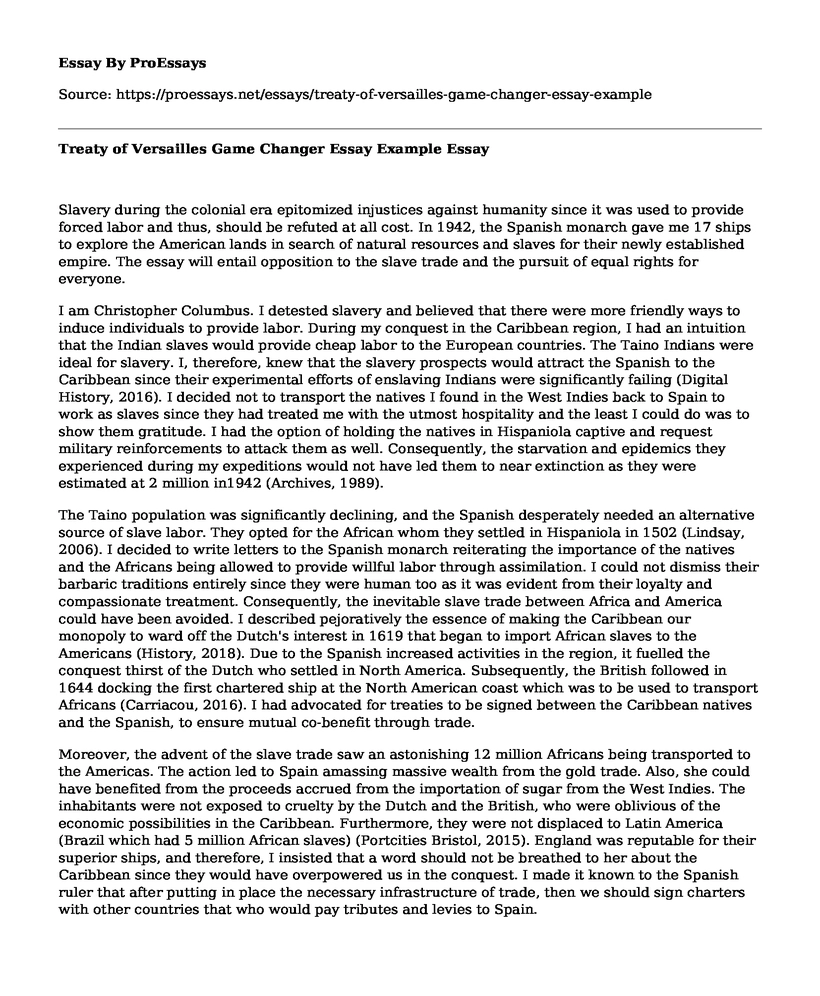Slavery during the colonial era epitomized injustices against humanity since it was used to provide forced labor and thus, should be refuted at all cost. In 1942, the Spanish monarch gave me 17 ships to explore the American lands in search of natural resources and slaves for their newly established empire. The essay will entail opposition to the slave trade and the pursuit of equal rights for everyone.
I am Christopher Columbus. I detested slavery and believed that there were more friendly ways to induce individuals to provide labor. During my conquest in the Caribbean region, I had an intuition that the Indian slaves would provide cheap labor to the European countries. The Taino Indians were ideal for slavery. I, therefore, knew that the slavery prospects would attract the Spanish to the Caribbean since their experimental efforts of enslaving Indians were significantly failing (Digital History, 2016). I decided not to transport the natives I found in the West Indies back to Spain to work as slaves since they had treated me with the utmost hospitality and the least I could do was to show them gratitude. I had the option of holding the natives in Hispaniola captive and request military reinforcements to attack them as well. Consequently, the starvation and epidemics they experienced during my expeditions would not have led them to near extinction as they were estimated at 2 million in1942 (Archives, 1989).
The Taino population was significantly declining, and the Spanish desperately needed an alternative source of slave labor. They opted for the African whom they settled in Hispaniola in 1502 (Lindsay, 2006). I decided to write letters to the Spanish monarch reiterating the importance of the natives and the Africans being allowed to provide willful labor through assimilation. I could not dismiss their barbaric traditions entirely since they were human too as it was evident from their loyalty and compassionate treatment. Consequently, the inevitable slave trade between Africa and America could have been avoided. I described pejoratively the essence of making the Caribbean our monopoly to ward off the Dutch's interest in 1619 that began to import African slaves to the Americans (History, 2018). Due to the Spanish increased activities in the region, it fuelled the conquest thirst of the Dutch who settled in North America. Subsequently, the British followed in 1644 docking the first chartered ship at the North American coast which was to be used to transport Africans (Carriacou, 2016). I had advocated for treaties to be signed between the Caribbean natives and the Spanish, to ensure mutual co-benefit through trade.
Moreover, the advent of the slave trade saw an astonishing 12 million Africans being transported to the Americas. The action led to Spain amassing massive wealth from the gold trade. Also, she could have benefited from the proceeds accrued from the importation of sugar from the West Indies. The inhabitants were not exposed to cruelty by the Dutch and the British, who were oblivious of the economic possibilities in the Caribbean. Furthermore, they were not displaced to Latin America (Brazil which had 5 million African slaves) (Portcities Bristol, 2015). England was reputable for their superior ships, and therefore, I insisted that a word should not be breathed to her about the Caribbean since they would have overpowered us in the conquest. I made it known to the Spanish ruler that after putting in place the necessary infrastructure of trade, then we should sign charters with other countries that who would pay tributes and levies to Spain.
Additionally, I advocated that Africans be emancipated through missionary work to come to the West Indies and participate in the trade too. I refused the 10% profits allotted to me by the Governor in a bid further my motives of equality (McCormack, 2018). In case they refused to adhere to my demands, I would have stopped my conquest in the Caribbean and return home with negative feedback.
Conclusion
In conclusion, I decided to twist the fate of history by disregarding the slave trade as a means of providing cheap labor. The Africans and the Caribbean natives were treated as equal trade partners by the Europeans. The current America would have developed into a racial tolerant environment due to the limited slave trade in the region.
References
Archives. (1989). Slavery and Colonialism Make up the True Legacy of Columbus: The New York Times. Retrieved from https://www.nytimes.com/1989/11/04/opinion/l-slavery-and-colonialism-make-up-the-true-legacy-of-columbus-866089.html
Carriacou, G. (2016). Slave Trade between Africa and the Caribbean from Start to End. Retrieved from http://carriacou.biz/slavetrade/Digital History. Slavery and Spanish Colonization: 1D 3569. Retrieved from http://www.digitalhistory.uh.edu/disp_textbook.cfm?smtID=2&psid=3569History. 2018. Columbus Controversy.
Lindsay, P. (2006). The Legacy of Christopher Columbus: Socialism and Liberation Magazine: Banderas News. Retrieved from http://www.banderasnews.com/0610/ent-cclegacy.htm
McCormack, Owen (2018). Uncomfortable Truth- Columbus was a Mass Killer and the Father of Slave Trade: Irish Central. Retrieved from https://www.irishcentral.com/roots/history/truth-columbus-mass-killer-father-slave-trade
Portcities Bristol.(2015). Spain's Slavery Contract.
Cite this page
Treaty of Versailles Game Changer Essay Example. (2022, Aug 23). Retrieved from https://proessays.net/essays/treaty-of-versailles-game-changer-essay-example
If you are the original author of this essay and no longer wish to have it published on the ProEssays website, please click below to request its removal:
- Compare and Contrast Essay on the Labor Forces in New England Colonies
- Essay on Youth Cultural Changes Between 1940's and 1970's
- Research Paper on Kamikazes In The World War 2
- Essay Example on Slavery, Freedom & Empire: Olaudah Equiano's Account 1763
- French Revolution: People's Dissatisfaction With Leadership - Essay Sample
- Essay Sample on Roaring '20s: A Decade of Growth & Change in America & Beyond
- Paper Example on Roman History: Cassius Dio's Insight on Marcus Antoninus







